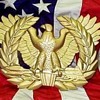Posted 9 years ago
 Chrisnp
Chrisnp
(310 items)
At the start of WWI, all the armies discovered that soldiers were suffering a disproportionately large number of head wounds, and began devising helmets to replace the existing headgear. While both the French and British fielded helmets in 1915, The Germans spent months in R&D and did not get theirs out till January 1916.
The Model 1916 stahlhelm was made to deflect shrapnel and debris. It was never intended to be bullet-proof, which would have made the helmet too heavy for continuous use. Instead the helmet incorporated two lugs that also served as ventilation ports. A 5mm thick steel shield could be mounted on the lugs to provide extra protection to the front of the helmet when additional protection was needed. As things worked out, the shields were not widely issued.
The chinstrap retainers (last photo) were the same as used on the previous leather spiked helmets. In 1918 a new model stahlhelm would have the chinstrap attached to the liner band. You can tell the M1916 from the M1918 from the outside by looking for the extra rivet head. Helmets were made in size 60 to 70, and my helmet is stamped on the inside “G62” which I believe is the manufacturer’s code, followed by the size. If anyone can further decipher this, I’d appreciate it.
My helmet has had a number of paintings, but if you look closely you can see the upper coat is worn away to reveal the “lozenge” camouflage pattern adopted in 1918. This pattern was large chunks of green, yellow ochre and brown, with a finger width line of black paint between the colors.
My helmet was later given a post war era grey-green paintjob, and you can see traces of WWII-style side decals. I’m no expert on WWII German helmet use, but I imagine this helmet saw use by the Volksturm or other reserve/home guard or police element.

















Fun trivia: The stahlhelm gained several nicknames, like "coal scuttle" or "chamber pot." In the English slang of the time, a chamber pot was called a "jerry". Eventually the name was applied to the wearer, and by the next war the Brits were calling Germans "jerries" (this according to Stephen Bull, a former curator at the National Army Museum, London.)
I saw one of these today. Was wondering what it was as it looked a German WWII helmet but not quite. Now I know, thanks for yet another informative post.
Nice helmet! I want one of these.
I appreciate the explanation on the "lugs"/ side projections, as I have wondered for decades. I've heard all the stories about metal insignia etc. all these yrs., & now you have made it clear. I do doubt the ventilation theory from a (maybe 3/8 m/m screw hole. Have a nice day, as I am! Actually, that was a good idea, as Germans are known for.
Hi BB2,
The helmet went through a long development process (almost all of 1915 - in my opinion too long, people were dying out there!) so there is solid information on the lugs/vents.
As attachment lugs, the designer's idea was that all combat personnel at the front would carry the shield, then at the command "Shutzshielde hoch!" they would all clap them on to their helmets. That never happened. Nobody was keen on toting around a big 2 1/2 pound chunk of steel around with them, and not many were produced. Instead, the few people who did use them were machine gunners, snipers, etc. Here's a picture of one if you scroll down the page:
http://www.warrelics.eu/forum/imperial-germany-austro-hungary/ww1-german-helmet-sniper-shield-18974-2/
As for their use as vents, the helmets got cold enough in winter that the German command issued a recommendation to wear a handkerchief under the helmet and block the vent holes with paper or mud.
Chris
My favorite part of the German R&D process this helmet went through was the artillery test. The Germans laid out 400 of these helmets in a couple different thicknesses, plus some spike helmets and captured enemy headgear. They then plastered the area with 60 artillery and howitzer rounds, then did a detailed analysis of the junk that remained.
Thanks for taking the trouble to throw that in.
No problem! This is one of my favorite pieces of equipment, and I personally think it was the best helmet around at the time.
Thanks for your comments, I'm always interested in your responses. Carry on with your great days in Jimmy Buffet land.
Chris
Well, at least until the statute de limitations expires. Somebody has to do it. LOL! A bientot
Thanks for the love battlegear, blunder, aghcollect, Manikin, Rattletrap, fortapache, and Militarist
Thx for the great info. Germans had awesome equipt but a corrupt cause. We need great leaders and engineers with great causes in a day when corruption and self service is rampant at ever level of life. Your helmet helps remind us of the war and what was being fought for. Thx